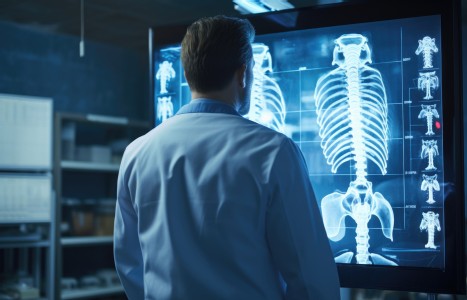Many relevant diagnostic signs are not performed deliberately by the examiner or by the patient at the examiner’s direction. They are observed as the patient reacts to their condition. Fortin’s finger sign, Minor’s sign, and Vanzetti’s sign are three examples of this principle.
Forensic What?
Less than half an hour after the local newspaper hit the street with the article about my completion of the first module as a member of the National Board of Forensic Chiropractors, the phone started ringing.
"Forensic what? Virgil," asked my undertaker friend, "What are you going to be doing with dead bodies?"
The same question continued for the rest of that day and for several weeks (and now months) afterward. At chamber of commerce meetings, social gatherings, and at the lunch table in local restaurants, the question is, "Are you going to be like Quincy now, Dr. Berry?" Even the attorneys and my medical friends and neighbors wanted to know "what are going to be doing now?" Patients wanted to know if I would be doing autopsies and if I planned to move away from the area.
It all started just over a year ago, when I received a brochure from an entity called the National Board of Forensic Chiropractors. In my daily rush, just as yours, I was going through the stack of that day's mail. I glanced at the front cover, thought to myself, "Just what we need, another national something or other," and immediately circle-filed the folder. I was fortunate enough to meet the founder of the NBOFC at a meeting in September of last year, and I discovered that forensic chiropractors are not like Quincy at all.
Forensic chiropractic deals with the relationship and application of science to legal problems. The forensic chiropractor is that professional who has developed the skill sets to perform an orderly analysis, investigation, tests and examinations in the quest to obtain the truth, and from that information is able to form an expert opinion. That expert opinion is indispensable in litigation involving issues of causation, in issues of impairment and disability, and in issues where record assessment as to content in order to determine if a logical basis for clinical decisions, orders and opinions exists.
The National Board of Forensic Chiropractors was founded by Preston B. Fitzgerald Sr., DC, and came into being in 1996. By November of that year, Dr. Fitzgerald had published The Independent Medical Evaluation Report: A Step By Step Guide, Chiropractic Supplement. By March of 1997, he had completed a 235-page syllabus on how to be an effective and successful chiropractor. In May of 1997, the first seminars were held in Atlanta, Georgia. By March of 1998, Logan College of Chiropractic became a co-sponsor of this post-doctoral seminar series.
The National Board of Forensic Chiropractors now has members from all across the country pursuing a certification program which has been formulated to: develop a level of knowledge, comprehension and understanding of the federal legal system; increase forensic expertise; chronicle and support the reason traumatic injuries require chiropractic care; and enhance skill sets to increase legal effectiveness and courtroom presentations. Guest lecturers include both defense and plaintiff attorneys and special agents of the Federal Bureau of Investigation involved in health care fraud.
There is a heavy demand in all three of the abovementioned areas for the services of highly trained and skilled professionals in the forensic arena. The stated purpose of the NBOFC is to advance the profession of forensic examination and consultation throughout the chiropractic profession by elevating standards through education and advanced training and certification.
If you would like more information, contact Dr. Preston B. Fitzgerald Sr., the NBOFC's executive director at 601B South Mill Street, Manning, South Carolina 29102; tel: (803) 435-5078.
Virgil Berry, DC
Starke, Florida


